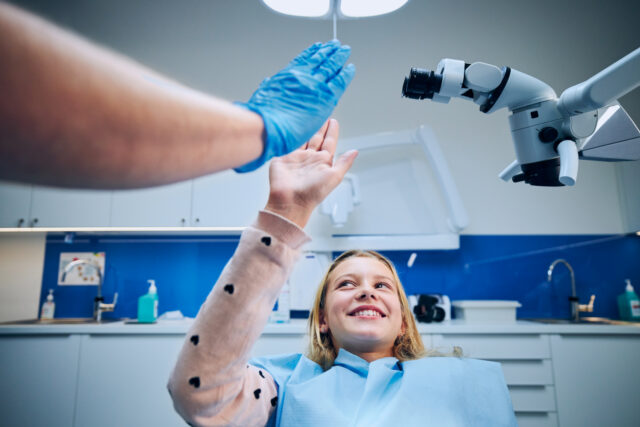Technology is reshaping dentistry, empowering clinicians and elevating patient care through advanced diagnostics, personalized treatments, and proactive prevention, while at the same time the world is facing an oral health crisis of epidemic proportions. The stage is set. Over half the global population endures untreated oral diseases, a figure that has skyrocketed by one billion in just three decades. The WHO demands immediate action to increase access to care and bolster preventive measures. Dentists are at the forefront of this charge, embracing innovative approaches to improve patient outcomes. Let’s look ahead at what we can expect for the future of the industry.
A Catalyst for Change
The integration of technology into dental practice is accelerating at an unprecedented pace. Artificial intelligence, machine learning, and computer vision are revolutionizing diagnostic and treatment procedures. Advanced software, like Overjet’s IRIS, can now analyze radiographs with greater precision, while digital dentistry tools streamline workflows and enhance the patient experience, with:
- AI-Powered Diagnosis: AI algorithms can analyze vast amounts of data to identify patterns and anomalies, leading to earlier detection of oral diseases.
- Robotic Dentistry: Robotic systems can assist in precise procedures, reducing human error and improving clinical outcomes.
- 3D Printing: This technology enables the creation of custom-made dental prosthetics and orthodontic appliances in-house.
The Rise of a Proactive Approach
Preventive dentistry is gaining prominence as a cornerstone of oral healthcare. By focusing on early intervention and regular check-ups, dentists can identify and address potential issues before they escalate into more serious (and costly) problems. This shift in paradigm is driven by a growing understanding of the link between oral health and systemic diseases. This approach focuses on:
- Oral Health Education: Empowering patients with knowledge about oral hygiene practices can significantly reduce the risk of dental problems.
- Risk Assessment: Identifying patients at high risk for oral diseases allows for targeted preventive interventions.
- Regular Check-ups: Routine dental examinations can detect early signs of decay, gum disease, and oral cancer.
Essential Partners in Care
Dental hygienists are integral to the delivery of preventive care. Their expertise in oral health education, plaque removal, and periodontal therapy is essential in maintaining optimal oral health. As the profession evolves and new strategies for addressing staffing shortages emerge, hygienists are taking on expanded roles and collaborating with dentists to provide comprehensive care. Look for ways you can leverage the unique expertise and collaborate with your hygienists:
- Expanded Duties: In many jurisdictions, dental hygienists are authorized to perform a wider range of procedures, such as administering local anesthesia and placing dental sealants.
- Oral Health Education: Hygienists play a crucial role in educating patients about proper brushing and flossing techniques, as well as the importance of regular dental check-ups.
- Periodontal Therapy: Hygienists are skilled in treating gum disease, a common oral health problem that can lead to serious systemic health issues.
A Vision for the Future
As we look ahead, embracing innovation, prioritizing prevention, and fostering strong patient relationships can help dentists continue to improve the oral health of their communities. Key trends that will shape the future of the industry include:
- Personalized Dentistry: Tailoring treatment plans to individual patient needs and preferences.
- Remote Dentistry: Leveraging telemedicine to provide accessible and convenient care.
- Biomaterials and Regenerative Dentistry: Developing advanced materials to repair and regenerate oral tissues.
- AI-Powered Dentistry: Utilizing AI to enhance diagnosis, treatment planning, and patient education.
- Enhanced Patient Experience: Focusing on creating comfortable and stress-free dental visits.
By staying informed about the latest advancements and adopting a proactive approach to patient care, dentists can position themselves as leaders in this exciting new era of dentistry.
But don’t just take our word for it, consider attending these end-of-year industry events to explore the latest technology and patient care trends for yourself:
November Dentistry Events
- ADEA CAAPID Virtual Fair | Nov. 19 | Virtual
- Greater New York Dental Meeting | Nov. 29-Dec. 4 | New York, NY
December Dentistry Events
- ASDO Next Level Mid-Market Conference | Dec. 2-4 | Austin, TX
- 35th American Dentistry Congress | Dec. 5-6 | Orlando, FL
- AAOMS Dental Implant Conference | Dec. 5-7 | Chicago, Il & Virtual
- ACP Digital Dentistry Symposium | Dec. 5-7 | Virtual
Additional Considerations
- Ethical Implications of AI: As AI becomes more integrated into dental practice, it’s crucial to address ethical considerations such as data privacy and algorithmic bias.
- Interdisciplinary Collaboration: Collaborating with other healthcare professionals, such as physicians and nutritionists, can lead to more comprehensive and effective patient care.
- Mental Health and Dentistry: Recognizing the impact of mental health on oral health and providing appropriate support can improve patient outcomes.
- Sustainability and Environmental Responsibility: Adopting eco-friendly practices in dental offices can contribute to a more sustainable future.
The future of dentistry is in the hands of those who dare to innovate and adapt. By embracing these trends and overcoming these challenges, dentists like you can inspire a new era of oral health, where every patient receives the care they deserve. Are you ready to take the lead in this new era of dentistry?
SOURCES: World Health Organization, Dentistry Today, Mayo Clinic, Oral Health Group





